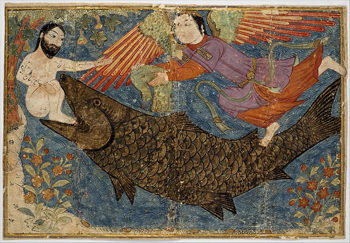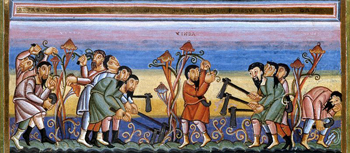For Sunday September 24, 2017
Lectionary Readings (Revised Common Lectionary, Year A)
Jonah 3:10-4:11
Psalm 145
Philippians 1:20-30
Matthew 20:1-6
In his 1993 book, Wishful Thinking: A Seeker's ABC, Frederick Buechner offers this advice about reading Scripture: "Don't start looking in the Bible for the answers it gives. Start by listening for the questions it asks." He goes on to say: "When you hear the question that is your question, then you have already begun to hear much.”
Two questions lie at the heart of this week’s lectionary readings. Neither is easy or comfortable to confront, but if we allow them to become our own, they might have something to teach us.
The first question is addressed to Jonah, the reluctant protagonist of this week’s Old Testament reading. Following his precarious adventure in the belly of the whale, Jonah has obeyed God’s instructions and warned the people of Ninevah that God is about to bring calamity on them for their wickedness. But in an astonishing turn of events, the Ninevites have taken Jonah’s warning to heart and repented, and God, seeing their penitence, has changed his mind and shown them mercy.
Instead of being thrilled at the success of his mission, Jonah responds with fury. He becomes so angry and despondent, in fact, that he tells God he would rather die than live, and hunkers down east of the city, hoping God will change his mind again and burn Ninevah to the ground. Instead, God offers Jonah an object lesson using a weed, a worm, and the wind, and concludes with a zinger of a question: “Is it right for you to be angry?”
The question is a fraught one, given the context, because Ninevah isn’t just any old city. It is the capital city of Assyria, Israel’s bitter enemy and tormenter. Notorious thoughout the Ancient Near East for its violence and depravity, Assyria is the empire that will eventually obliterate the northern kingdom of Israel. To Jonah, then, God’s question is a ridiculous one. Of course he has a right to be angry! Isn’t it right to be angry that God’s mercy extends to ruthless killers? Isn’t it right to be angry that violent, dangerous people don’t get the fire and brimstone they deserve? Isn’t it right to be angry that God’s profligate grace overturns our cherished assumptions about justice, righteousness, and the appropriate punishment of evildoers?
 |
I love the fact that God doesn’t rebuke Jonah for his anger. Instead, he playfully attempts to broaden Jonah’s horizons, so that Jonah will see the Ninevites as God sees them. For while they might be everything Jonah believes them to be, they are also more. They are a “great city,” but they are broken and lost. They are people, God says, “who do not know their right hand from their left.” Most importantly of all, they are God’s. Just as the whale, the weed, the worm, and the wind in Jonah’s story belong to God, so do the Assyrians themselves. They are his creations — his to plant, his to tend, his to uproot. Should God not care for his own? Is it right for Jonah to be angry?
The story ends with this hard question unanswered. We are left with Jonah still sulking, sitting outside the city and waiting to see what will happen to a people he hates and God loves. And so we, too, are left to wrestle with the scandalous goodness of God, a goodness that insists we become instruments of God’s grace even to our worst enemies. A goodness that asks us why we so often prefer vindication to rehabilitation. Why we crave punishment for the lost and broken, instead of healing and hope. Why we happily grab every second chance God gives us, even as we deny second chances to others. Why we nurse envy and bitterness in our hearts, refusing to see the complexity God sees in the faces of those who wish us harm.
Do we have a right to be angry? God leaves us to decide.
The second and related question comes from the New Testament reading for this week, the “Parable of the Generous Landowner,” as related in the Gospel of Matthew. In the story Jesus tells, a landowner goes out to the marketplace early in the morning to gather day laborers for his vineyard. After agreeing to pay them each a denarius — a day’s living wage, the minimum required to keep a small family fed, housed, and clothed — he sends them off to work. During the course of the day, however, he returns to the marketplace a surprising four more times — at 9:00am, at noon, at 3:00pm, and even at 5:00, a mere hour before quitting time — and recruits everyone he finds there, promising to pay them each “whatever is right” at the end of the day.
Sure enough, when the workday is over, the landowner instructs his manager to pay the laborers. But he tells him to do so in an odd way. Pay them in reverse order, he tells his manager, starting with those who worked the least number of hours, and ending with those who put in a full day. The manager proceeds as directed, and pays each laborer exactly the same amount — one denarius. When the laborers who started work at the crack of dawn see this, they are enraged, and protest the blatant unfairness of the landowner: “These last have worked only one hour,” they say, “and you have made them equal to us who have borne the burden of the day and the scorching heat.” But the landowner deflects their accusations, and answers them with a question similar to God’s question to Jonah: “Am I not allowed to do what I choose with what belongs to me? Or are you envious because I am generous?”
| |
Are you envious because I am generous? Writer Mary Gordon, in her book Reading Jesus, calls this “an impossible question, calling for an impossible honesty.” Because yes, she writes: “I am envious because you are generous. I am envious because my work has not been rewarded. I am envious because someone got away with something. Envy has eaten out my heart.”
I appreciate Gordon’s candor, because really, if this parable doesn’t offend us at least a little bit, then we’re not paying attention. After all, we know how the world is supposed to work. Time is money, and fair is fair. Equal pay for equal work is fair. Equal pay for unequal work is NOT fair. Where I live in Silicon Valley, technology start-ups often turn initial investors into millionaires, and why shouldn’t they? Surely those who took the biggest risks and worked the hardest in the beginning deserve to reap the greatest rewards. The early bird gets the worm. It’s only fair.
But God — if indeed the landowner in this parable represents God — is not fair. At least, not according to our cherished beliefs about fairness. This God, it turns out, does not believe that the best place to be is at the front of the line. He isn’t interested, as we so often are, in showing favor to the best and the biggest and the brightest — the workers with the most elite educations, astonishing professional achievements, or fanciest zip codes. This God is not obsessed with who deserves what. In fact, he doesn’t even ask why some workers were able to start at dawn and others were not. All that he’s obsessed with is making sure that every last person gets a place in his vineyard — the early bird and the latecomer, the able-bodied and the infirm, the young and the old, the popular and the forgotten.
In case we’re tempted to relegate the economics of this story to first century Palestine, let’s consider its implications again. Why did some laborers end up unemployed until 5pm? The parable is very clear: because no one would hire them. Perhaps they weren’t as literate, educated, or skilled as their competition. Perhaps they had children to care for at home. Maybe they had transportation difficulties. Maybe they were disabled, or didn’t have greencards, or suffered discrimination. Whatever the case may be, the landowner doesn’t ask these laborers to defend themselves. He just makes sure that every worker ends the day with the dignity and security of a living wage — the capacity to go home that night and feed his family.
“Are you envious because I am generous?” asks God. Or literally, in the Greek: “Is your eye evil because I am good?”
It embarrasses me to admit this, but ever since I was a little girl, I have always assumed, when hearing or reading this parable, that I would have been one of the 6:00am workers in the landowner’s vineyard. Of course I’d be first in line and ready to go before the sun came up. Of course I’d work the hardest and the longest. Of course I’d be the most deserving of the landower’s praise. After all, I’m Type A! I’m a good girl! I’m a “J” on the Myers-Briggs and a 6 on the Enneagram! I’m a perfectionist! And a people pleaser!
 |
But consider this: the parable reads very differently if you situate yourself at the end of the line. The workers who got more than they expected to — the ones who received more pay than they thought they deserved — were ecstatic at the end of their workday. Ectastic, stunned, thrilled, and grateful. What they experienced that day was pure blessing, and I’ll bet that what went on at their end of the line was one big raucous party.
But all the other stuff? The envy? The bitterness? The grumbling? The dissatisfaction? Those belonged to the “deserving” folks at the front of the line. Though the landowner had honored his agreement with them, though they had received their daily bread, though they lacked no good thing, they spent their off-hours consumed with frustration and anger. “Is your eye evil because I am good?” the landowner asked them. Maybe, if God’s generosity offends us so much, it’s because we don’t have eyes to see where we actually stand in the line of God’s overflowing grace and kindness.
I find it instructive that the landowner insisted on paying the workers in reverse order, thereby making sure that the first workers saw what the last received. How much easier it would have been to pay the all-day laborers first, sending them home before they could see what their “less deserving” counterparts received. But no, the landowner wanted them to see what kind of vineyard he ran. He wanted them to experience radical generosity. He wanted them to surrender their envy and join the party.
Is it right for you to be angry?” Are you envious because God is generous? Listen for the questions. When you hear the question that is your question, then you have already begun to hear much.
Image credits: (1) Wikipedia.org; (2) Wikipedia.org; and (3) Wikipedia.org.



